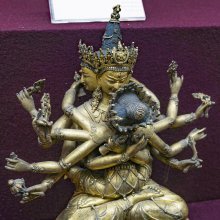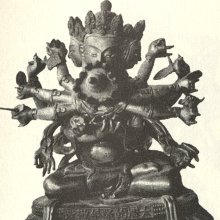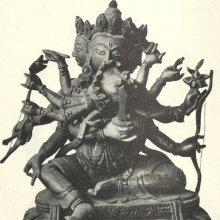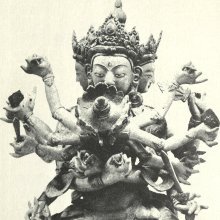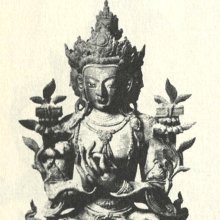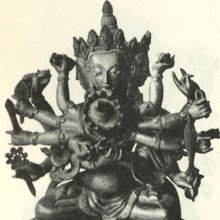Guhya, Guhyā: 25 definitions
Introduction:
Guhya means something in Buddhism, Pali, Hinduism, Sanskrit, Marathi, Hindi. If you want to know the exact meaning, history, etymology or English translation of this term then check out the descriptions on this page. Add your comment or reference to a book if you want to contribute to this summary article.
Alternative spellings of this word include Guhm.
Images (photo gallery)
(+5 more images available)
In Hinduism
Shaivism (Shaiva philosophy)
Source: Wisdom Library: Ṣaṭsāhasra-saṃhitāGuhyā (गुह्या):—One of the twelve guṇas associated with Gola, the sixth seat of the Svādhiṣṭhāna-chakra. According to tantric sources such as the Śrīmatottara-tantra and the Gorakṣasaṃhitā (Kādiprakaraṇa), these twelve guṇas are represented as female deities. According to the Ṣaṭsāhasrasaṃhitā however, they are explained as particular syllables. They (e.g. Guhyā) only seem to play an minor role with regard to the interpretation of the Devīcakra (first of five chakras, as taught in the Kubjikāmata-tantra).
Source: Shodhganga: Iconographical representations of ŚivaGuhya (गुह्य) or Guhyāgama refers to one of upāgamas (supplementary scriptures) of the Niśvāsāgama which is one of the twenty-eight Siddhāntāgama: a classification of the Śaiva division of Śaivāgamas. The Śaivāgamas represent the wisdom that has come down from lord Śiva, received by Pārvatī and accepted by Viṣṇu. The purpose of revealing upāgamas (e.g., Guhya Āgama) is to explain more elaborately than that of mūlāgamas (e.g., Niśvāsa-āgama) and to include any new idea if not dealt in mūlāgamas.
Source: Brill: Śaivism and the Tantric Traditions1) Guhya (गुह्य) refers to the “genitals” representing one of the nine Granthis (‘knots’ or ‘joints’), according to verse 4.497ff of the Brahmayāmala-tantra (or Picumata), an early 7th century Śaiva text consisting of twelve-thousand verses.—Accordingly, “[...] A series of nine lotuses is visualized situated at points in the body called granthis (knots or joints). These are located at the crown of the head, the forehead, throat, navel, knees, mouth, heart, genitals (guhya), and feet, following the order of their sequence in nyāsa. The eight-petalled lotuses situated therein are loci for installation of the principal nine deities: Kapālīśabhairava, who is installed in the crown lotus, and two sets of four goddesses, the Devīs and the Dūtīs [i.e., Bhīmavaktrā, to be installed on the genitals]. [...]”.
2) Guhya (गुह्य) (Cf. Rahasya) refers to a “secret”, according to the 13th-century Matsyendrasaṃhitā: a Kubjikā-Tripurā oriented Tantric Yoga text of the Ṣaḍanvayaśāmbhava tradition from South India.—Accordingly, “[The intercourse (saṃga)]:—[...] This is the secret (guhya) of alchemy. He should not reveal it to others. This secret (rahasya) of the Siddha tradition, which is difficult to obtain, has now been taught. It is to be revealed through the compassion of the Guru. What else do you wish to hear?”.

Shaiva (शैव, śaiva) or Shaivism (śaivism) represents a tradition of Hinduism worshiping Shiva as the supreme being. Closely related to Shaktism, Shaiva literature includes a range of scriptures, including Tantras, while the root of this tradition may be traced back to the ancient Vedas.
Purana and Itihasa (epic history)
Source: archive.org: Shiva Purana - English TranslationGuhya (गुह्य) refers to “esoteric” or “esoterism”, according to the Śivapurāṇa 2.2.43.—Accordingly, as Śiva said to Dakṣa:—“O patriarch, listen to another statement of mine with a clear conscience. Although it is based on the qualitative aspect it is esoteric (guhya). For the sake of virtue I shall tell you. Brahmā, Viṣṇu and I constitute the chief cause of the universe. But I am the soul, the witness, self-seer and without attributes. [...]”.

The Purana (पुराण, purāṇas) refers to Sanskrit literature preserving ancient India’s vast cultural history, including historical legends, religious ceremonies, various arts and sciences. The eighteen mahapuranas total over 400,000 shlokas (metrical couplets) and date to at least several centuries BCE.
Shaktism (Shakta philosophy)
Source: Google Books: Manthanabhairavatantram1) Guhya (गुह्य) refers to a “secret” (i.e., Śrīkaṇṭha’s hymn in praise of the Goddess), according to the second recension of the Yogakhaṇḍa of the Manthānabhairavatantra, a vast sprawling work that belongs to a corpus of Tantric texts concerned with the worship of the goddess Kubjikā.—Accordingly, “The purified soul who, pure, recites this [i.e., Śrīkaṇṭha’s hymn in praise of the Goddess] in front of the Kramaliṅga is free from all sins and attains Rudra’s world. It was uttered by Śrīkaṇṭha and, secret [i.e., guhya], it should not be told to (just) anybody. It should be given to a true devotee, (and) never to one who is averse (to the goddess). [...]”.
2) Guhyā (गुह्या) refers to the “hidden one”, according to the Kālī teachings of Abhinava’s Jayadrathayāmala.—Accordingly, “That energy (called) Kuṇḍalinī resides in the Secret Wheel [i.e., guhya-cakra] (in the genitals). O fair lady, that place which fulfils all desires should always be kept secret. Then (it is called) Guhyā (the Hidden One) and is always more secret than the secret. The nectar that comes out of this is hard to acquire by gods or demons. A thousand rebirths are destroyed in the Ocean of Kula of one who possesses it. [...] Amā, the energy of the (New) Moon is located in the Door of Brahmā. Pure water falls (from) there and, having fallen into the heart of Kuṇḍalī, the nectar which is the juice of Kuṇḍalī comes out of his body. By just eating this, (Yogis) become immortal and free of old age, wrinkles, white hair and all diseases.”.

Shakta (शाक्त, śākta) or Shaktism (śāktism) represents a tradition of Hinduism where the Goddess (Devi) is revered and worshipped. Shakta literature includes a range of scriptures, including various Agamas and Tantras, although its roots may be traced back to the Vedas.
Jyotisha (astronomy and astrology)
Source: Wisdom Library: Brihat Samhita by VarahamihiraGuhya (गुह्य) refers to the “genital organs”, according to the Bṛhatsaṃhitā (chapter 5), an encyclopedic Sanskrit work written by Varāhamihira mainly focusing on the science of ancient Indian astronomy astronomy (Jyotiṣa).—Accordingly, “If the lunar eclipse should terminate at the south-western and north-western points of the disc, the terminations are known as dakṣiṇa-pāyu (right anus) and vāma-pāyu (left anus) respectively: there will be diseases of the genital organs [i.e., guhya-ruj] in the case of both terminations and the Queens of reigning sovereigns will suffer in the case of the latter. If the lunar eclipse should commence and terminate at the eastern point of the disc, the termination is known as sañchardana (vomitting): there will be prosperity and joy in the land and food crops will flourish”.

Jyotisha (ज्योतिष, jyotiṣa or jyotish) refers to ‘astronomy’ or “Vedic astrology” and represents the fifth of the six Vedangas (additional sciences to be studied along with the Vedas). Jyotisha concerns itself with the study and prediction of the movements of celestial bodies, in order to calculate the auspicious time for rituals and ceremonies.
Yoga (school of philosophy)
Source: ORA: Amanaska (king of all yogas): A Critical Edition and Annotated Translation by Jason BirchGuhya (गुह्य) refers to the “(supreme) secret”, according to the Niśvāsakārikā verse 32.149cd-152.—Accordingly, as the Lord teaches the Yoga of detachment to the Goddess: “O goddess, listen to the supreme secret [i.e., guhya—paraṃ guhyaṃ] [teaching] and its unsurpassed Siddhi. It has no form, no colour and no meditation. It is both with and without aspects. It lacks anything through which it can be acted upon and it has no location. [This] great no-mind yoga is not a division of [mantra] recitation, is free from form and colour [but] gives all Siddhis”.

Yoga is originally considered a branch of Hindu philosophy (astika), but both ancient and modern Yoga combine the physical, mental and spiritual. Yoga teaches various physical techniques also known as āsanas (postures), used for various purposes (eg., meditation, contemplation, relaxation).
In Buddhism
Mahayana (major branch of Buddhism)
Source: Wisdom Library: Maha Prajnaparamita SastraGuhya (गुह्य) refers to “three secrets” in the Buddha according to the 2nd century Mahāprajñāpāramitāśāstra (chapter XV).—Thus it is said in the Mi tsi kin kang king (Guhyakvajrapaṇi-sūtra): “There are three secrets (guhya) in the Buddha: the body secret (kāyaguhya), the speech secret (vāgguhya) and the mind secret (cittaguhya). Neither gods nor men can grasp them or understand them”.

Mahayana (महायान, mahāyāna) is a major branch of Buddhism focusing on the path of a Bodhisattva (spiritual aspirants/ enlightened beings). Extant literature is vast and primarely composed in the Sanskrit language. There are many sūtras of which some of the earliest are the various Prajñāpāramitā sūtras.
Tibetan Buddhism (Vajrayana or tantric Buddhism)
Source: academia.edu: A Critical Study of the Vajraḍākamahātantrarāja (II)Guhyā (गुह्या) is the name of a Goddess (Devī) presiding over Oḍyāyana: one of the twenty-four sacred districts mentioned in the 9th century Vajraḍākatantra (chapter 18). Her weapon is the vajra and śṛṅkhala. Furthermore, Guhyā is accompanied by the Kṣetrapāla (field-protector) named Mahānāda or Mahābala and their abode is an aśoka-tree.
Source: Brill: Śaivism and the Tantric Traditions (tantric Buddhism)Guhya (गुह्य) or Guhyābhiṣeka refers to the first of three higher initiations, according to the Saptāṅga (Cf. Vāgīśvarakīrti’s Tattvaratnāvaloka verse 17).—The coded language expresses what happens in the three higher initiations (guhyābhiṣeka, prajñājñānābhiṣeka, caturthābhiṣeka), the first two of which are of a sexual nature. The Saptāṅga makes it clear that the first stage, where the seed from the thunderbolt oozes and cleanses, alludes to the guhya-abhiṣeka, where in practice the officiating master copulates with a consort and the ejaculates are placed in the mouth of the blindfolded initiand. Via this rite, the mind of the initiand, which is similar to a field, is purified.
Source: OSU Press: Cakrasamvara SamadhiGuhya (गुह्य) refers to “secret (assemblies)”, according to the Guru Mandala Worship (maṇḍalārcana) ritual often performed in combination with the Cakrasaṃvara Samādhi, which refers to the primary pūjā and sādhanā practice of Newah Mahāyāna-Vajrayāna Buddhists in Nepal.—Accordingly, “Agni, Yama, Nirṛiti, lord of the earth, lord of water, Vāyu, and lord of wealth, Īśāna, lord of all beings and gods, and above the sun, moon and Brahmā. All gods whoever in the earth and Nāgas, mountains with secret assemblies (guhya-gaṇa), Being a counter to, do once offer, the ghosts in each of your own directions. [...]”.

Tibetan Buddhism includes schools such as Nyingma, Kadampa, Kagyu and Gelug. Their primary canon of literature is divided in two broad categories: The Kangyur, which consists of Buddha’s words, and the Tengyur, which includes commentaries from various sources. Esotericism and tantra techniques (vajrayāna) are collected indepently.
Languages of India and abroad
Marathi-English dictionary
Source: DDSA: The Molesworth Marathi and English Dictionaryguhya (गुह्य).—a (S) Private, solitary, retired--a place. 2 Secret, hidden, concealed--an act, affair, event.
--- OR ---
guhya (गुह्य).—n (S) An organ of generation.
Source: DDSA: The Aryabhusan school dictionary, Marathi-Englishguhya (गुह्य).—a Private, solitary, retired–a place Secret, hidden, concealed–an act, affair.
Marathi is an Indo-European language having over 70 million native speakers people in (predominantly) Maharashtra India. Marathi, like many other Indo-Aryan languages, evolved from early forms of Prakrit, which itself is a subset of Sanskrit, one of the most ancient languages of the world.
Sanskrit dictionary
Source: DDSA: The practical Sanskrit-English dictionaryGuhya (गुह्य).—pot. p.
1) To be concealed, covered or kept secret, private; गुह्यं च गूहति (guhyaṃ ca gūhati) Bhartṛhari 2.72.
2) Secret, solitary, retired.
3) Mysterious; Bhagavadgītā (Bombay) 18.63; पुरुषार्थज्ञानमिदं गुह्यम् (puruṣārthajñānamidaṃ guhyam) Sāṅ K.69.
-hyaḥ 1 Hypocrisy.
2) An epithet of Viṣṇu.
3) A tortoise.
-hyam 1 A secret, mystery; मौनं चैवास्मि गुह्यानाम् (maunaṃ caivāsmi guhyānām) Bhagavadgītā (Bombay) 1.38;9.2; Manusmṛti 12.117; Pañcatantra (Bombay) 2.49; नास्य गुह्यं परे विद्युः छिद्रं विद्यात्परस्य च (nāsya guhyaṃ pare vidyuḥ chidraṃ vidyātparasya ca) Kau. A.1.15.
2) A privity, the male or female organ of generation; सगुडं पिष्टरचितं गुह्यरूपं जुगुप्सितम् (saguḍaṃ piṣṭaracitaṃ guhyarūpaṃ jugupsitam) Kathāsaritsāgara 2.56.
3) The anus.
4) a private, secret place; मैथुनं सततं धर्म्यं गुह्ये चैव समाचरेत् (maithunaṃ satataṃ dharmyaṃ guhye caiva samācaret) Mahābhārata (Bombay) 12.193.17.
Source: Cologne Digital Sanskrit Dictionaries: Edgerton Buddhist Hybrid Sanskrit DictionaryGuhya (गुह्य).—= guhyaka, see next.
Source: Cologne Digital Sanskrit Dictionaries: Shabda-Sagara Sanskrit-English DictionaryGuhya (गुह्य).—mfn.
(-hyaḥ-hyā-hyaṃ) 1. Secret, solitary, retired. 2. Private, concealable, to be kept hidden or secret. 3. Mysterious, mystical. m.
(-hyaḥ) 1. A tortoise. 2. Hypocrisy. 3. Vishnu. n.
(-hyaṃ) 1. A privity, an organ of generation, &c. 2. The anus. E. guh to cover, kya affix, deriv. irr.
Source: Cologne Digital Sanskrit Dictionaries: Cappeller Sanskrit-English DictionaryGuhya (गुह्य).—[adjective] (to be) hidden or covered, secret. [neuter] a secret, mystery, [adverb] secretly, in silence.
Source: Cologne Digital Sanskrit Dictionaries: Monier-Williams Sanskrit-English Dictionary1) Guhya (गुह्य):—[from guh] mfn. ([Pāṇini 3-1, 109; Kāśikā-vṛtti] [gana] daṇḍādi) to be covered or concealed or hidden or kept secret, concealable, private, secret, mysterious, mystical, [Ṛg-veda; Atharva-veda] etc.
2) [v.s. ...] m. hypocrisy, [cf. Lexicographers, esp. such as amarasiṃha, halāyudha, hemacandra, etc.]
3) [v.s. ...] a tortoise, [cf. Lexicographers, esp. such as amarasiṃha, halāyudha, hemacandra, etc.]
4) [v.s. ...] Name of Viṣṇu ([Religious Thought and Life in India] p.106), [Horace H. Wilson]
5) [from guh] n. a secret, mystery, [Mahābhārata] (ifc. f(ā). , [xiii, 5876]), [Manu-smṛti xii, 117; Bhagavad-gītā] etc.
6) [v.s. ...] n. the pudenda, [Suśruta; Varāha-mihira’s Bṛhat-saṃhitā; Kathāsaritsāgara ii, 56] (cf. 1. gṛhya) the anus, [Horace H. Wilson]
Source: Cologne Digital Sanskrit Dictionaries: Yates Sanskrit-English DictionaryGuhya (गुह्य):—[(hyaḥ-hyā-hyaṃ) a.] Secret. m. A tortoise; hypocrisy; Vishnu. n. A privity; the arms.
Source: DDSA: Paia-sadda-mahannavo; a comprehensive Prakrit Hindi dictionary (S)Guhya (गुह्य) in the Sanskrit language is related to the Prakrit words: Gujjha, Gujjhaa.
[Sanskrit to German]
Sanskrit, also spelled संस्कृतम् (saṃskṛtam), is an ancient language of India commonly seen as the grandmother of the Indo-European language family (even English!). Closely allied with Prakrit and Pali, Sanskrit is more exhaustive in both grammar and terms and has the most extensive collection of literature in the world, greatly surpassing its sister-languages Greek and Latin.
Hindi dictionary
Source: DDSA: A practical Hindi-English dictionaryGuhya (गुह्य) [Also spelled guhm]:—(a) occult; secret.
...
Kannada-English dictionary
Source: Alar: Kannada-English corpusGuhya (ಗುಹ್ಯ):—
1) [adjective] kept as a secret.
2) [adjective] fit to be maintained as a secret.
3) [adjective] beyond general knowledge or understanding; mysterious or esoteric.
--- OR ---
Guhya (ಗುಹ್ಯ):—
1) [noun] that which is or must be, kept as a secret.
2) [noun] a sin, crime etc. that must not be committed.
3) [noun] an additional, supplementary or auxiliary thing or matter (as opp. to the main one).
4) [noun] the sexual organ (of a human being).
5) [noun] a narrow, long piece of cloth, used to cover the loins (as by ascetics or some peoples in warm climates, esp. aboriginals).
6) [noun] a place fortified by mountains on all the sides and having a single entrance.
--- OR ---
Gūhya (ಗೂಹ್ಯ):—[adjective] secret; not known; kept from the knowledge of.
Kannada is a Dravidian language (as opposed to the Indo-European language family) mainly spoken in the southwestern region of India.
Nepali dictionary
Source: unoes: Nepali-English DictionaryGuhya (गुह्य):—adj. 1. secret; mysterious; clandestine; 2. esoteric; 3. concealed; kept dark; kept secret;
Nepali is the primary language of the Nepalese people counting almost 20 million native speakers. The country of Nepal is situated in the Himalaya mountain range to the north of India.
See also (Relevant definitions)
Starts with (+55): Guhya sattar, Guhya-biri, Guhya-silam, Guhyabhashana, Guhyabhashita, Guhyabhisheka, Guhyabija, Guhyacakra, Guhyadevi, Guhyadhara, Guhyadhipati, Guhyadipaka, Guhyagana, Guhyagarbha, Guhyagarbhatantra, Guhyagupta, Guhyaguru, Guhyaka, Guhyakadhipa, Guhyakadhipati.
Ends with (+3): Bhagaguhya, Buddhaguhya, Chittaguhya, Cittaguhya, Devaguhya, Hamsaguhya, Kaviguhya, Kayaguhya, Koshagatavastiguhya, Koshavastiguhya, Koshopagatavastiguhya, Paraguhya, Rajaguhya, Samghaguhya, Shashiguhya, Siddhaguhya, Triguhya, Upaguhya, Vagguhya, Vamadevaguhya.
Full-text (+115): Guhyanishyanda, Guhyabhashita, Guhyadipaka, Gujjha, Guhyaguru, Guhyapushpa, Sarvaguhyamaya, Guhyamaya, Devaguhya, Guhyam, Upaguhya, Guhyapati, Guhyaruj, Guhyavidya, Guhyakali, Yajnaguhya, Gujjhaa, Rajaguhya, Guhyeshvari, Hamsaguhya.
Relevant text
Search found 54 books and stories containing Guhya, Guhyā, Gūhya; (plurals include: Guhyas, Guhyās, Gūhyas). You can also click to the full overview containing English textual excerpts. Below are direct links for the most relevant articles:
Rig Veda (translation and commentary) (by H. H. Wilson)
Shrimad Bhagavad-gita (by Narayana Gosvami)
Verse 9.1 < [Chapter 9 - Rāja-guhya-yoga (Yoga through the most Confidential Knowledge)]
Verse 18.68 < [Chapter 18 - Mokṣa-yoga (the Yoga of Liberation)]
Verse 18.64 < [Chapter 18 - Mokṣa-yoga (the Yoga of Liberation)]
Garga Samhita (English) (by Danavir Goswami)
Verse 8.13.1 < [Chapter 13 - A Thousand Names of Lord Balarāma]
Verse 5.22.1 < [Chapter 22 - The Story of Śrī Nārada]
Verse 8.10.16 < [Chapter 10 - The Paddhati and Paṭala of Lord Balarāma]
Hari-bhakti-kalpa-latikā (by Sarasvati Thkura)
Text 2 < [Second Stabaka]
Srila Gurudeva (The Supreme Treasure) (by Swami Bhaktivedanta Madhava Maharaja)
Kṛpa-Pātra, The Reservoir of Mercy < [Chapter 2.4 - The Uttamā Bhāgavata and Kṛpa-Pātra]
Service to Vaiṣṇavas is best < [Chapter 1.2 - Śrīla Gurudeva’s Pūrvāśrama]
Śrī Kṛṣṇa’s Reflection Pastime < [Chapter 2.2 - Śrīman Mahāprabhu’s Greatest Donation]
Some Guhyas and Ganas < [January – March, 1987]
A Vedic Conception of the Poet < [May-June 1933]
